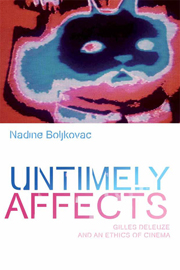Introduction
Published online by Cambridge University Press: 05 September 2013
Summary
To think is to reach a non-stratified material, somewhere between the layers, in the interstices. Thinking has an essential relation to history, but it is no more historical than it is eternal. It is closer to what Nietzsche calls the Untimely: to think the past against the present – which would be nothing more than a common place, pure nostalgia, some kind of return, if he did not immediately add: ‘in favor, I hope, of a time to come’. (TR: 241)
To identify and defend the argument, strategies and contributions of this film-philosophy study, which emerge against the proliferating field of ‘Deleuze studies’ and the works of French film artists Chris Marker and Alain Resnais, it is crucial to first consider the actual events that gave rise to this book's selection of film s and writings. This book's impetus derives from its cine-philosophical interrogations of war, suffering, affliction and, significantly, humanity's complicity and shame in these means of its own ruin from which it must yet become and survive. These actual experiences that History has identified, compartmentalised and assessed – the Holocaust, Hiroshima, the peril and prognostics of nuclear devastation, further injustices of fascism, colonialism and capitalism – compel this exploration of a select number of Marker and Resnais films in relation to Gilles Deleuze's writings, interviews and lectures.
- Type
- Chapter
- Information
- Untimely AffectsGilles Deleuze and an Ethics of Cinema, pp. 1 - 10Publisher: Edinburgh University PressPrint publication year: 2013



